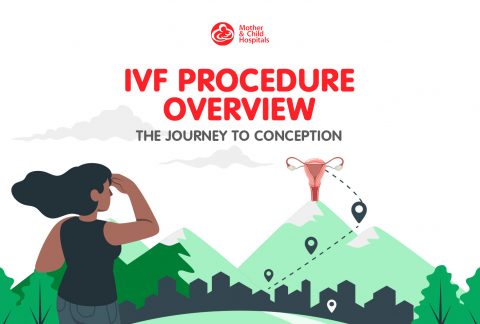-

A Comprehensive Guide to IVF
Understanding the Journey of IVF
Embarking on the intricate procedure of in vitro fertilization (IVF) is a moving event that combines the desire for parenthood, hope, and fortitude. IVF is frequently the ray of hope for couples struggling with infertility. This blog post sheds light on the various facets of in vitro fertilization (IVF), exploring the emotional landscape surrounding this reproductive procedure and its technical nuances.
In vitro fertilization is a medical process that makes it possible to conceive a child outside the mother’s body. It entails several laborious procedures, each essential to a successful pregnancy.
Ovulation induction, in which we stimulate the ovaries to create numerous eggs, is the first step in the In Vitro Fertilization Assisted Reproductive Technology method. After that, we open the woman’s ovaries to retrieve the eggs. The eggs are then carefully mixed with sperm in a lab to begin fertilization. We closely observe the resultant embryos in a regulated setting during the embryo culture phase. An embryo is chosen and then placed into the uterus in the hopes of implantation and eventual pregnancy after it is judged viable.
Beyond the technical aspects of the procedure, lifestyle choices significantly impact the outcome of IVF. A balanced diet, frequent exercise to maintain a healthy weight, and giving up unhealthy behaviours like smoking and binge drinking can positively impact fertility.
It is equally vital for people to consider their post-treatment life as they navigate the unpredictable world of in vitro fertilization. While celebrating success in IVF treatment is lovely, the path may also involve overcoming obstacles and considering alternative family-building options. In vitro fertilization is more than just medical treatment; it also involves lifestyle decisions, mental fortitude, and a positive outlook.
It is best to use a professional fertility clinic, where the services of embryologists, fertility nurses, and doctors can help promote a positive outcome. IVF comes with some medical risks, which can complicate the process if not done at a reputable fertility center. Therefore, we must emphasize the importance of visiting quality-driven IVF centers equipped with the latest healthcare equipment and fertility specialists to support you. Call Fruitful Field today at 08129209860, click https://bit.ly/MCHAR or visit us at 2 Omole Layout, Ogunnusi Road, Ojodu.Mother and Child Hospital
-

Understanding Autism: Meaning, Diagnosis and Management
Indications and Implications of Autism
Autism spectrum disorder (ASD) encompasses a broad range of conditions characterized by persistent challenges with social skills and interaction, repetitive behaviours, restricted interests, and speech and nonverbal communication. There are many types of autism. Autism is not limited to children, although early diagnosis will improve support so that they can improve interactions and independent living in the long term and explore the best learning methods for them. Many autistic children will make significant progress in their development with time.
Autism does not denote a limitation. As a society, we should remember that everyone has unique strengths and challenges, which is the case with autism. While some people with autism may need more support with schooling, safety or daily activities, others thrive in school with little support and are independent as adults. Also, autism is not a function of gender, age or ethnicity. There is no single known cause of autism. It may be due to genetics, family history, medications such as valproic acid, sedatives or anti-nausea meds taken during pregnancy or parents being older at the time of pregnancy.
Early signs are noticeable as early as the first birthday. Many autistic signs appear by age 2 or 3; however, there are several instances of diagnosis in adulthood when not adequately monitored in childhood. The United States Centers for Disease Control and Prevention (CDC) recommends that every child be screened for autism between 18 months and 2 years, especially when they show interest in a few activities, exhibit repetitive behaviour and show delays in speech, gross and fine motor skills and social-emotional development.
When a parent, caregiver or teacher notices signs of autism, a pediatrician, especially one specialized in development, a pediatric psychologist, a child neurologist, or a psychiatrist can diagnose autism. To diagnose, they will ask what you have observed about your child, ask specific questions about your child’s development, and conduct behavioural testing and observations. An autism diagnosis can be unexpected and emotional. However, it is not something to dread. It means you must make changes and institute a plan to support your child. Working with your developmental expert and support systems, you will be well on your way to helping your child maximize their potential.
Interventions such as applied behavioural analysis with structured plans for improving adaptive skills, social skills training, speech and language therapy, and occupational daily activity therapy will strengthen skills development. Through parent or caregiver management training and support groups, parents learn effective ways of encouraging appropriate behaviour in their child and access support. In special education services, children learn to address language, social skills, communication deficits, restricted interests, and repetitive behaviours.
Sometimes, conditions such as attention-deficit/hyperactivity disorder (ADHD), anxiety or sleep disorders may be present alongside autism. Management is with the interventions above and psychotherapy. A pediatrician, primary physician or psychologist will prescribe medication where appropriate for mental health conditions.
Although autism is a lifelong condition, it is not a limitation to one’s ability to be successful. An autistic person’s needs may change over time, requiring various levels of support as they grow. However, early intervention and therapies significantly impact skills development and outcomes later in life.
Our partner network and in-house pediatrician will support you with excellent care for autism screening, diagnosis and management. Visit Mother and Child Hospital at 2 Omole Layout, Ogunnusi Road, Ojodu. Please call +234 703 620 2190 to confirm an appointment.
Mother and Child Hospital
-

Tips to improve your mental health
How to improve your mental health.
Mental health is crucial to our well-being. Taking care of it will help you feel happier, more productive, and better able to cope with life’s challenges. This blog post will explore tips for improving your mental health.
1. Practice Self-Care
Self-care is essential for good mental health. Make time for activities you enjoy, such as reading, bathing, or spending time with friends.Eat a healthy diet (cut down or eliminate alcohol, no smoking, drink 2L of water daily, eat a balanced diet), sleep well (6 hours of sleep daily), and exercise regularly (30 minutes of exercise 5 times a week is the standard). Taking care of yourself can help you feel better both physically and mentally.
Part of self-care is knowing your body, taking note of changes in your physical features. Visit the hospital promptly when you feel anything unusual.
2. Connect with others
Connecting with others promotes mental health. Spend time with friends and family, join a social group or participate in community activities. Finding time to bond with others can help you feel supported and less isolated.3. Manage stress
Stress can hurt mental and physical health. Try relaxation methods such as deep breathing and meditation to manage your mood. Make time for activities that help you relax, such as yoga or a massage.4. Seek Professional Help
If you’re struggling with your mental health, get professional help. A trained mental health person will support and guide you to health. They will provide treatment where necessary and help you cope.5. Practice gratitude
Practice gratitude to improve your mental health. Take time each day to reflect on what you’re grateful for, such as your health, family, or job. Focus on the things going well in your life and the positives around you to boost your mood and improve your outlook on life.6. Limit Social Media and News Consumption
Social media and news can be overwhelming and stressful. Reduce your consumption of social media and news to reduce stress and anxiety. Instead, focus on natural activities and things that bring you joy and relaxation.Conclusion
Your mental health is essential for your overall well-being. By practicing self-care, connecting with others, managing stress, seeking professional help, practicing gratitude, and limiting social media and news consumption, you can improve your mental health.
Identify stressors around you and learn to cope with or avoid them where possible to feel better emotionally, physically and mentally. See a healthcare provider if your stress levels are rising without apparent physical symptoms.
Need to speak with a medical professional? Please call +234 703 620 2190 (Omole) or +234 706 837 2987 (Adeniyi Jones) for bookings and appointments to see a doctor. You can also walk into Mother and Child Hospital at 2 Omole Layout, Ogunnusi Road, Ojodu or 39 Adeniyi Jones Avenue, Ikeja, Lagos State.
Mother and Child Hospital
-

How stress impacts fertility
How stress affects fertility & self-care tips
Stress has become an unavoidable part of everyday life. Stress is how the body responds to changes (pressure) physically, emotionally, and mentally. Stress can be positive (a new job pushing you to stretch yourself) or negative (losing contact with loved ones).
In this blog post, we will explore the connection between stress and fertility and provide strategies for managing mental health to improve your chances of conception.
Understanding the Stress-Fertility Connection:
Stress can push people toward unhealthy habits that affect fertility. Chronic stress can disrupt the hormonal balance necessary for ovulation and sperm production, causing irregular ovulation or reducing sperm count and motility.
Mind-Body Techniques for Stress Reduction:
Practice journaling and meditation to remind yourself of the good things you have going on. Gratitude uplifts your mood. You can also explore yoga and deep breathing exercises as effective stress-reduction methods.
Lifestyle Changes:
A balanced diet, regular exercise, and adequate sleep reduce stress. In contrast, intake of alcohol, caffeine and smoking add to stress and reduce fertility. Explore natural endorphin hormone-boosting activities, like massage and sports, that help you feel good.
Seek Professional Help:
At Fruitful Field, we provide counselling for those going through fertility treatment. We encourage individuals and couples to consult mental health professionals if stress severely affects their fertility journey. Our fertility solutions include IVF treatment through Intracytoplasmic Sperm Injection (ICSI), Intrauterine Insemination (IUI), Semen Freezing, Gender Selection, Cryopreservation (Eggs & Embryos), and Transport IVF.
The Importance of Emotional Support:
When we have good relationships, it supports our emotional health.
Don’t blame your self or your partner for not conceiving or delivering. Instead eliminate mental stress by leaning on your loved ones, and tackling the causes. Communicate regularly with support groups, and stay accountable to your health providers during fertility struggles.
Conclusion:
Stress is a common factor that can negatively impact fertility, but it’s not insurmountable. By adopting stress-reduction techniques, making lifestyle changes, and seeking professional help, individuals and couples can better manage their mental health and increase their chances of conceiving.
To book a consultation with a fertility specialist and take your journey towards success, click here or call +234 812 920 9860.
Mother and Child Hospital
-

Adequate sleep improves your mental health
Adequate sleep improves your mental health.
Getting enough sleep is essential for maintaining good mental health.
Without a doubt, sleep helps to regulate our emotions, reduce stress and anxiety, and improve our ability to concentrate and make decisions. Therefore, when we don’t get enough sleep, we’re more likely to experience mood swings, irritability, and difficulty coping with daily challenges. Stress affects a huge part of our life, including fertility, and poor sleep habits build up stress.
While you sleep, your body supports healthy brain function and maintains your physical health.
Furthermore, sleep helps children and young people grow mentally and physically.
Studies show people who are sleep-deprived are more moody, irritable, angry, sad or frustrated.
Sleeplessness can be a marker of conditions such as anxiety and depression or contribute to developing mood and mental health disorders. Consequently, sleep disorders like insomnia, narcolepsy and sleep apnea have lifestyle impacts.
We can improve our overall mental health and well-being by prioritizing good sleep.
How much sleep do you need?
How much sleep you need depends on age, physical activity, and general well-being. For instance, a pregnant woman may notice changes in her sleep pattern due to hormonal changes. However, constant fatigue may be a sign of anemia.
We recommend 9-10 hours of sleep for children and teenagers. Younger children tend to sleep and wake earlier, but as they grow into teenagers, they get tired later and sleep in. Adults need 8 hours of sleep. You may need more sleep if you (or your children) are tired during the day.
Tips for getting a good night’s sleep
- – Stick to a consistent sleep schedule daily
– Have a relaxing bedtime routine to prepare you for bed
– Avoid caffeine, nicotine, and alcohol before bedtime
– Make sure your bedroom is calm, quiet, and dark
– Invest in a comfortable mattress and pillows
– Limit your exposure to screens before bed
– Exercise regularly, but not too close to bedtime
– Avoid eating heavy or spicy meals before bedtime
– Incorporate deep breathing, meditation and other relaxing methodsBy incorporating these tips into your routine, you will sleep better and wake up energized. Sleep trouble may be a pointer to a lifestyle change you need to make. If the situation is persistent, however, you should see a doctor.
We take bookings and appointments through various channels if you need to speak to a doctor. You can walk into any of our hospitals without booking an appointment. Contact our customer care numbers, +234 703 620 2190 (Omole) or +234 706 837 2987 (Adeniyi Jones) for enquiries.
Mother and Child Hospital
- – Stick to a consistent sleep schedule daily
-

Emergency Care
What is Emergency Care?
Emergency Care, also known as First Aid, is simple, effective management or care given to a casualty of injury or sudden illness until they can access more advanced care. It is also immediate care by a first respondent when a person is injured or ill until complete medical treatment is available.
The aims of Emergency Care/ First Aid are:
• To preserve life
• To protect the unconscious casualty
• To prevent further injury or pain
• To promote recovery.5 Types of Basic First Aid:
1. Cardiopulmonary Resuscitation: Cardiopulmonary resuscitation (CPR) professionals can assist a cardiac arrest victim to regain breathing. CPR involves making sure the person’s airway is clear before maintaining blood circulation by employing rescue breathing and chest compressions.
2. Bleeding: To avoid excessive blood loss, stopping a cut from bleeding is essential. In addition, knowing the type of bleeding will help you gauge its intensity and determine when the patient needs medical assistance.
3. Burns: To treat a burn, you must first eliminate the cause—heat, a chemical, or electricity—and then thoroughly cool the injured area with running water.
4. Choking: A blockage cutting off a person’s airway might render them unconscious or cause death. It’s critical to know when someone is choking and requires assistance.
5. Broken Bones: to avoid further harm, you should treat any injury to a hand, foot, or limb like a broken bone.
5 Basic Steps to First Aid Treatment:
- Danger: Always ensure the area is secure before going near a victim.
- Response: Verify the victim’s level of responsiveness.
- Airway: Next, make sure the airway is open and unobstructed.
- Breathing: Now, you must determine whether the victim is breathing regularly.
- Circulation
A number of situations may warrant urgent move of a patient to a hospital facility including symptoms of stroke, Hemorrhage, danger sign in pregnancy or an accident situation (domestic or otherwise).
Call 07036202190 (Omole) or 070683729787 (Adeniyi Jones) for emergency response as required within Lagos. Our ambulance service is topnotch as the vehicle carries necessary emergency instruments, including a mobile ventilator, monitor, defibrillators and regular oxygen supply to help patients. In addition, the paramedics are prepared to respond to emergencies and move patients.
Our facility has up-to-par adult and neonatal intensive care units and qualified professionals to treat patients admitted to our hospital.
Mother and Child Hospitals does not discriminate while delivering healthcare services. We are:
• A team of compassionate doctors and specialist consultants.
• A committed medical hospital in Nigeria.
• Operating from two locations in Ikeja and Omole, Lagos State.
• Invested in offering world-class service.Mother and Child Hospital
-

How to Stay Motivated to Exercise
How to Stay Motivated to Exercise
It is not easy to stay motivated to exercise, especially when life gets busy or you’re feeling tired and need to see the direct changes in your body immediately. However, regular exercise is vital for maintaining good health and well-being. This blog post will explore tips for staying motivated to exercise.
1. Set Realistic Goals
Realistic fitness goals will help you stay on track. Break your goals into bits. Start small and work your way up to bigger goals. For example, if you’re new to exercise, start walking for 10 minutes a day – five days a week and gradually increase your time and intensity. Also, know your body as different people have different metabolism rates and the food intake for each person to hit a fitness goal would not be the same.2. Find Exercises You Enjoy
Finding routines you enjoy can make all the difference. Try different exercises such as dancing to a song mix, running, swimming, or cycling until you find something you enjoy. When you enjoy the exercise, you’re more likely to stick with it.3. Develop an Exercise Routine
Schedule your exercise at the same time each day and for a specified duration so it becomes a habit. A routine will help you stay on track and make exercise a regular part of your day.4. Get a Workout Partner
A fitness buddy or community can help keep you accountable and inspired to work out. Find a friend or family member who enjoys exercise and make plans to work out together. This can make exercise more fun and enjoyable. You can also sign up to join a fitness community.5. Reward Yourself
Give yourself a reward when you achieve your little and bigger goals. When you meet your goal, such as working out for 30 minutes a day for a week, reward yourself with something you enjoy, such as a movie or a massage.6. Track Progress
Record your workouts, including the type of exercise, duration, and intensity. This can help you see your progress and motivate you to keep going.Staying motivated to exercise, though challenging, is worth it for the health benefits. By setting realistic goals, finding an exercise you enjoy, creating a routine, getting a workout buddy, rewarding yourself, and tracking your progress, you can stay motivated to exercise and make it a regular part of your day.
If you need medical fitness support, please call +2347036202190 (Omole) or +23470683729787 (Adeniyi Jones) to schedule a physical or virtual consultation with a Physiotherapist or Dietician.
Mother and Child Hospital
-

Infertility Treatment Options
Infertility Treatment
There are a variety of treatment options available for infertility, depending on the underlying cause. These treatments include:
– Medications: Fertility drugs can help regulate hormones and stimulate ovulation.
– Surgery: In cases where anatomical abnormalities are causing infertility, surgery may be necessary to correct the problem.
Assisted Reproductive Technologies (ART): ART includes procedures such as Intracytoplasmic Sperm Injection (ICSI), in vitro fertilization (IVF), and Intrauterine Insemination (IUI). These procedures involve fertilizing eggs outside the body and transferring them to the uterus.
– Lifestyle Changes: Making certain lifestyle changes, such as reducing alcohol consumption, quitting smoking, and maintaining a healthy weight, can improve fertility.
Conclusion
Infertility affects many couples worldwide. Infertility may be caused by various factors: hormonal imbalances, anatomical abnormalities, or lifestyle factors.It can be an emotionally charged experience. However, there are a variety of treatment options available. If you are dealing with infertility, talk to your doctor or a fertility specialist to discuss your options and develop a treatment plan that is right for you.
Rely on support from loved ones or a mental health professional to help you through the emotional impact of infertility. Infertility is a medical condition, and getting help is a marker of strength, not weakness.
Our fertility specialists at Mother and Child Hospital Fertility Clinic in Lagos, Nigeria, are prepared to help you realize your desire by utilizing the most cutting-edge scientific methods.
We offer a variety of assisted reproductive services, including fertility testing for both individuals and couples, IVF, IUI, ICSI, cryopreservation – egg freezing, embryo freezing, and more.
The Mother and Child Fruitful Field Clinic is dedicated to the effective diagnosis and management of infertility and to the psychological health of couples and individuals experiencing it.
Review our services for more information about assisted reproductive technologies, or contact us for questions on fertility.
Mother and Child Hospital
-

Importance of healthy eating
Why maintaining a healthy eating lifestyle is important.
Eating healthy is one of the most important things you can do for your body and mind.
A good diet is essential for a healthy weight and reduces the chance of chronic diseases such as cancer, diabetes and heart disease. In addition to these physical benefits, eating healthy can increase your energy levels, productivity and mood. Couple a good diet with consistent exercise, and you’ll notice a positive change in your mind and body.
A nutrient-dense and whole foods-rich diet supplies your body with energy to function at its best. You feel more alert, focused, and productive throughout the day.
For a pregnant woman, eating from all food groups helps meet the high nutrients you and your baby need. Likewise, a breastfeeding mother is her baby’s vital source of nutrition.
Finally, eating healthy can help you live a longer, happier life. By reducing chronic disease risk and improving your well-being, a healthy diet helps you enjoy a higher quality of life for long.
To start eating healthy, incorporate more vegetables, healthy fats, whole grains, lean proteins, and fruits into your diet. Avoid processed foods, sugary drinks, and excessive amounts of salt and sugar. Additionally, drink plenty of water throughout the day.
How to maintain a healthy eating lifestyle:
- – Incorporate more fruits and vegetables into your plate.
– Choose whole grains over refined grains
– Eat lean proteins such as chicken, fish, and avoid red meat
– Limit your intake of processed things, sugary drinks, salt and sugar
– Drink lots of water throughout the day. Stay hydrated!
– Plan your meals ahead of time to avoid unhealthy choices when you’re hungry.
– Pay attention to your hunger and fullness signals.
– Avoid eating while distracted, such as while watching TV or working on your computer.
– Cook more meals at home to have more control over the ingredients in your food.
– Allow yourself occasional treats in moderation to avoid feeling deprived.
Eating healthy doesn’t have to be boring or restrictive. Plenty of delicious and nutritious recipes can excite your taste buds and give your body the necessary nutrients. So, make changes to your diet today and enjoy a healthier life.
Remember to do regular physical examinations, at least annually, whether or not you feel symptoms. This will tell what lifestyle changes you should make, including on your diet.
A Consultant Endocrinologist and Dietitian are available at our facilities on appointment, and you can see a Physician following the Consultants Schedule. Please call 07036202190 (Omole) or 070683729787 (Adeniyi Jones) for details.
Mother and Child Hospital
- – Incorporate more fruits and vegetables into your plate.
-

Hope and Joy Through IVF
Infertility Explained
In Vitro Fertilization (IVF) as an assisted reproduction method has brought joy and hope to many couples struggling with infertility.
Here are some of the gains of IVF:
Overcoming infertility: One of the primary joys of IVF is overcoming infertility and fulfilling the dream of having a child. For couples trying to conceive for a long time without success, IVF offers a chance to experience parenthood joys.
Increased chances of conception: IVF significantly increases the chances of conception for couples unsuccessful with other fertility treatments. By combining the sperm and egg in a laboratory setting, IVF bypasses certain fertility barriers. ICSI provides a higher likelihood of successful fertilization.
Genetic screening: IVF often involves preimplantation genetic testing, which allows the screening of embryos for genetic disorders or chromosomal abnormalities. Embryo screening helps identify healthy embryos for transfer, reducing the risk of passing genetic diseases to the child.
Embryo selection: With IVF, fertility specialists stimulate multiple embryos for the woman and select the best quality ones for transfer. Embryo selection gives couples and their healthcare providers more control over the selection process, increasing the chances of a successful pregnancy.
Surrogacy option: IVF can also be combined with gestational surrogacy, allowing couples unable to carry a pregnancy to have a biological child. A gestational surrogate carries the embryo created through IVF, providing a way for intended parents to have a genetic connection with their child.
Emotional support: IVF often involves a comprehensive support system, including medical professionals, counsellors, and support groups. This network can provide emotional support throughout the IVF journey, helping couples navigate the emotional ups and downs and providing reassurance during challenging times.
Building a family: The ultimate joy of IVF is building a family and experiencing the love, joy, and fulfillment that comes with having a child. For many couples, IVF has allowed them to achieve their dream of becoming parents, bringing immense happiness.
It’s important to note that IVF can also be challenging and emotionally taxing, and outcomes may vary for each individual or couple. Having realistic expectations and seeking appropriate medical and emotional support during the IVF journey is essential.
Fruitful Field is the assisted reproduction arm of Mother and Child Hospital that exists to help people have healthy babies through medical interventions. The Fertility Center offers services in Intracytoplasmic Sperm Injection (ICSI), Intrauterine Insemination (IUI), Pre-Implantation Genetic Testing, Transport IVF and more. Click here to register to speak to our consultants or call +2348129209860.
Mother and Child Hospital
Author archive for Mother and Child Hospital
Mother & Child Hospitals > Articles by: Mother and Child Hospital
